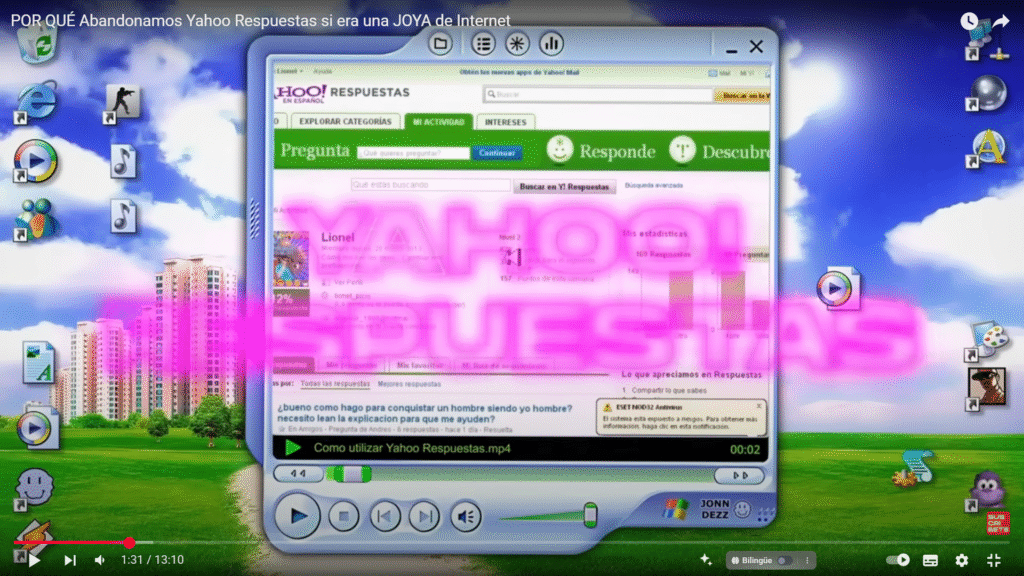In the 2000s, before TikTok, Instagram, or Reddit forums, there was a digital corner that shaped an entire generation of internet users: Yahoo Answers . It was a place where the absurd coexisted with the profound, where someone could ask how to boil an egg and another user could ask if it was already dead without knowing it.
Although the platform officially shut down in 2021, its legacy lives on in the collective memory and in the memes that circulate to this day. But what made Yahoo Answers so special, and how did it become a global phenomenon before falling into obscurity?
What was Yahoo Answers?
Yahoo Answers was born in 2005 as a risky but revolutionary venture: a space where anyone could ask questions and anyone could answer them. It didn’t matter whether it was an existential question, a medical question, or a cooking recipe. The idea was to democratize knowledge and trust the community.
In its first year, the platform accumulated more than 10 million responses in 12 languages . By 2010, it had surpassed 1 billion responses and had more than 200 million active users worldwide.
The secret lay in its human nature. Unlike services like Google Answers, which charged for answers, Yahoo Answers relied on voluntary participation. This made it a space where people felt free to ask whatever they wanted, without shame and with the certainty that someone, somewhere in the world, would have an answer.
The benefits that Yahoo Answers offered
Although it became chaotic over time, this platform provided significant lessons about how online collaboration can transform the way we share information. Here are some of its most notable benefits:
- Democratization of knowledge:
Anyone could ask and answer questions, regardless of their academic level or specialty. This eliminated barriers and made access to information more inclusive. - Connecting Strangers
Millions of users found on the platform a place where they not only had their doubts resolved, but also felt supported in their most personal questions. - Gamification and Motivation
The points and level system encouraged participation. Users competed to give the “best answer,” which generated a sense of community and belonging. - Humor and Collective Creativity
From iconic phrases like “What do you want to know that for? Haha, cheers” to misspelled questions that became memes, Yahoo Answers brought unique moments to the internet that we still remember today. - Free and immediate access.
Unlike other platforms, there was no need to pay or wait too long. With a simple Google search, a Yahoo Answers thread was likely to appear among the first results.
Lessons from Yahoo Answers
Beyond nostalgia, the rise and fall of this platform offers useful lessons for understanding how digital communities evolve:
- Trust in people is powerful, but it needs limits.
The initial lack of moderation led to both large contributions and misinformation. The balance between openness and control is key to maintaining healthy communities. - Humor can boost virality.
Many of the most memorable phrases and questions weren’t because of their usefulness, but because of the humor of the situation. This demonstrated the value of entertainment in building digital culture. - Competition always comes.
Platforms like Quora and Stack Exchange offered a more serious and reliable space, while social networks like Facebook and Twitter absorbed the fast-paced conversations. - Nothing lasts forever on the internet.
Even a giant like Yahoo Answers, with millions of users, eventually disappeared. Its closure in 2021 was a reminder of how rapidly the digital world changes.
How can we leverage Yahoo Answers’ legacy today?
Although the platform no longer exists, many of its dynamics live on in other spaces. If you want to replicate the best of Yahoo Answers in your digital experience, here are some practical steps:
- Use specialized forums.
If you’re looking for serious answers, platforms like Quora, Stack Overflow, or Reddit offer very active and organized communities. - Participate in social media groups.
On Facebook, Telegram, or Discord, there are thematic communities where you can immediately resolve questions with people who share your interests. - Create and share knowledge.
If Yahoo Answers has taught us anything, it’s that we all have something to contribute. You can start a blog, a YouTube channel, or participate in forums sharing your expertise. - Be critical of information.
One of the biggest criticisms of Yahoo Answers was its lack of reliability. Now more than ever, verify sources and compare facts before accepting any answer as truth. - Keep the human side of the internet alive.
Not everything has to be algorithms and experts. The value of communities lies in sharing experiences, making mistakes, and learning together.
Additional tips for interacting in digital communities
- Provide value before asking. Reciprocity is still key: if you help others, more people will want to help you.
- Maintain a respectful tone. The internet can be a hostile space, but it’s always best to contribute with empathy.
- Enjoy humor. Absurdity is often what connects most with other users.
- Support your answers. Whenever possible, cite sources or share personal experiences to add credibility.
Yahoo Answers is no longer around, but its mark on the history of the internet is indelible. It was a chaotic, fun, and often absurd space, but also a place where millions of people felt heard and supported.
The closure of this platform reminds us that the essence of the internet isn’t perfection, but human interaction. And although we live in a much more controlled and moderated environment today, there will always be room for that creative and spontaneous spark that made Yahoo Answers great.
So the next time you have a strange or existential question, don’t hold back: share it on your favorite digital communities. You never know if someone behind the screen will be the answer you were looking for… or a simple, but eternal: “Why do you want to know that? Haha, cheers.”



